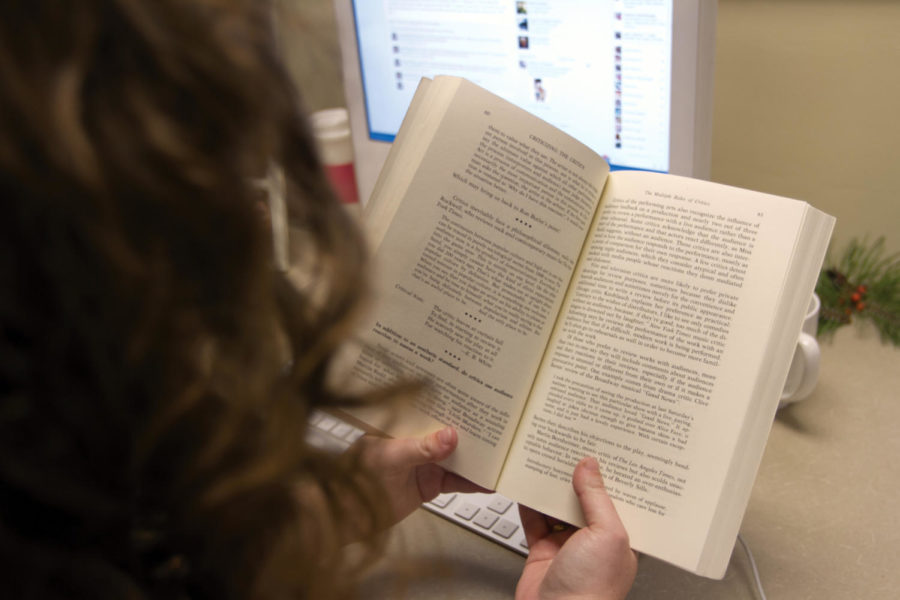Henry: Bad habits and technology interfere with real reading
Photo Illustration: Megan Wolff/Iowa State Daily
Opinion: Henry 11/14
November 14, 2012
What was the last thing you read? Was it reading for class? The New York Times? Or was it your Facebook and Twitter news feeds? I’m ashamed to say that in the past 20 minutes, for me, it’s been social media and a few pages out of my constitutional law textbook. Books and newspapers are accessible from several online sources and through electronic devices which take away from traditional reading of print sources. Also, once we enter college, I feel as though any amount of reading for pleasure ceases to happen.
I can point the finger of blame at many things. I could say my life is hectic with extracurriculars, school work, and making sure I have time to breathe (which is true). I could blame it on the fact that textbooks have made me hate reading of any form (which is partially true). Unfortunately, these excuses don’t last long. The biggest reason why I and so many of my peers and colleagues no longer read for pleasure is not that we don’t have time, we simply don’t make time.
The excuses we make up as to why we don’t read anymore aren’t as concerning as the amount of people, even outside of college, who have eliminated reading from their daily lives. While it’s not quite a surprise 65 percent of college freshmen in 2005 said they read little or nothing for pleasure, it’s troubling that 42 percent of college graduates never read another book after college.
Is it possible that technology and Internet are to blame? Out of adult Internet users, 37 percent of them read books less frequently than they use the Web. We can, however, take into account that not all Internet users use the majority of their time on the Internet for social media. The convenience of online news sources allow readers to stay on top of current events while on the go, and some are easier to use than print sources. Others prefer online sources because they are more attractive than their print counterparts.
However, researchers suggest people are able to retain more information and key points from actual newspapers than their online equivalents. The same study also suggests online news sources are somewhat distracting because the pages are sometimes cluttered with advertisements and hyperlinks.
Resources such as Wikipedia and SparkNotes give students an easy way out of doing their reading and research assignments. Time and time again, professors drill into our heads that Wikipedia isn’t a valid source. We don’t listen, but we really should.
The process of using Wikipedia isn’t new. Anybody can write and edit Wikipedia articles, and Wikipedia fact-checkers edit articles on a daily basis. However, mistakes happen a few too many times — and not just minor mistakes like incorrect dates or spelling a name wrong. For example, former Kennedy adviser John Seigenthaler Sr. was implicated in the Kennedy assassinations. Chances are, fact-checking is rare if a student is in a rush to finish an assignment.
The transition from print to online takes away from the authenticity of reading a book or a news story. Since 2003, online revenue gains far exceed those of print revenue. However, for the last two years, revenue lost by print sources hasn’t been exceeded by the revenue gains from digital sources. Although it’s inevitable that digital sources will eventually replace newspapers, this major change most likely won’t happen for a few decades.
For example, any major media outlet has an app for the iPhone, and War and Peace is a free book via the iPhone Books app. I remember when tackling a Tolstoy classic was on my bucket list. I imagined myself completing that life goal from an actual book, and didn’t think that I could simply download it to my phone. Sure, I enjoy the convenience, but then I remember the joy of buying new books and being able to enjoy them. Reading has always been one of my favorite simple pleasures of life.
Bad habits and changes in technology are changing the way we learn and read. Whether you’re reading for work or reading for pleasure, you won’t learn or enjoy it quite as much if you’re not doing it properly (i.e, using SparkNotes or skimming through an online news website). Our generation grew up with library card catalogs on notecards and reading the comics in the Sunday newspaper. There’s something special about starting your day with a newspaper and or a real book.

















